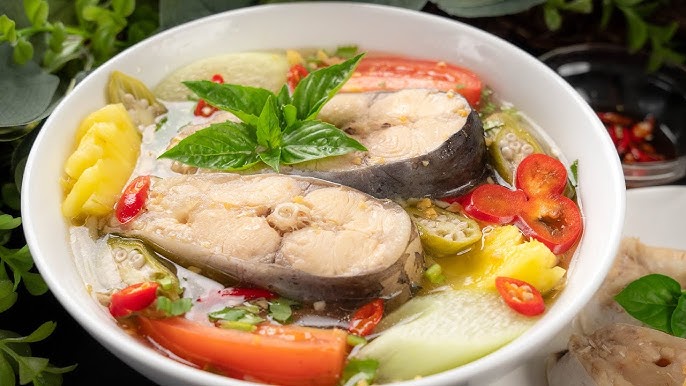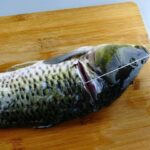Why Does Fish Soup Sometimes Smell Fishy?
The fishy odor is caused by amino acids such as trimethylamine and dimethylamine. These are weak alkaline compounds. In freshly caught fish, the level of these amino acids is low, but as time passes, the fishy smell becomes more pronounced.
To neutralize the alkalinity and eliminate the fishy smell, try the following methods: Apply high heat by boiling the water or pan-frying the fish before cooking. This causes the amino acids to evaporate, resulting in a soup that doesn’t smell fishy. However, cooking methods may vary according to regional preferences.

How to Cook Fish Soup Without the Fishy Smell
More Tips to Avoid Fishy Smell in Fish Soup
Use acidic ingredients: Traditional cooks often add acidic ingredients such as vinegar, green mango, sour fruits, tamarind, or sour bamboo shoots to neutralize the fishy smell. These ingredients contain acids that react with trimethylamine in the fish, forming soluble salts and effectively removing the odor. In Northern Vietnam, sour fish soup usually includes only one type of acidic ingredient, such as fish sauce (a type of vinegar) combined with grilled sour bamboo shoots or tamarind. In contrast, the sour fish soup in the South combines multiple sour flavors from tamarind, pineapple, and tomato, with some households even adding a splash of calamansi juice at the end.
Use astringent ingredients: In many rural areas, people cook fish soup with banana flowers or green bananas, such as “Canh cá mè om chuối mẻ” or “Canh cá quả om hoa chuối.” These ingredients not only make the dish more rustic but also help reduce the fishy smell. People in Central Vietnam often use tannin-rich tea water to wash or cook fish, as the astringent quality of tannin effectively counteracts the amino acids that cause the fishy odor.

Should You Use Boiling Water or Cold Water When Cooking Fish Soup?
Use bitter ingredients: The specialty of many mountainous districts in Thanh Hoa province is fish soup cooked with bitter leaves, which is loved by many for its mild bitterness and the natural sweetness of the fish. Bitter leaves are also used in traditional medicine to treat indigestion, gastrointestinal diseases, and alcohol intoxication.
Use spicy ingredients: According to Eastern medicine, fish is considered a cooling food. To balance this, add warm or hot spices such as ginger, black pepper, onion, and garlic when preparing or cooking the fish. These spices not only enhance the flavor but also help reduce the fishy smell to some extent. For example, adding crushed ginger to fish and cabbage soup or garnishing a bowl of sour fish soup from the South with fried garlic can elevate the dish’s taste and aroma.
Use aromatic herbs: In Northern Vietnam, fish soup is often flavored with dill and scallions, while ethnic minorities in the mountainous regions use celery. In Southern Vietnam, fish sour soup is typically accompanied by rice paddy herb and celery, adding color to the dish and reducing any remaining muddy fishy smell.





































